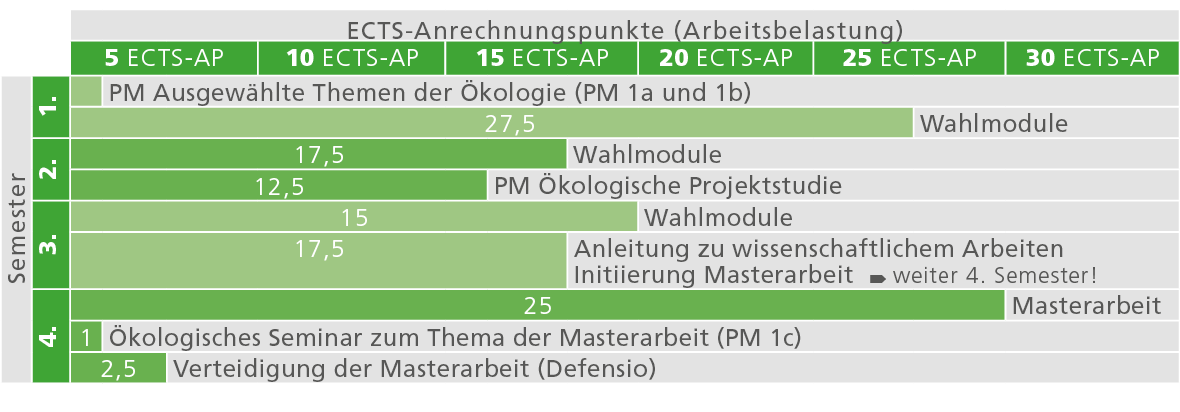Masterstudium Ökologie und Biodiversität
Curriculum (2008W)
Master of Science
Dauer/ECTS-AP
4 Semester / 120 ECTS-AP
Studienart
Vollzeit
Unterrichtssprache
Deutsch
Voraussetzung
Fachlich infrage kommender Bachelorabschluss oder Äquivalent und Sprachnachweis
Fakultät
Fakultät für Biologie
Niveau der Qualifikation
Master (2. Studienzyklus)
ISCED-11: Stufe 7, EQR/NQR: Stufe 7
ISCED-F
0521 Umweltwissenschaften
Studienkennzahl
UC 066 833
Das Curriculum ist die Grundlage eines Studiums und vermittelt einen detaillierten Überblick zum Aufbau, zum Inhalt, zur Prüfungsordnung und zum Qualifikationsprofil.
Mittels Curriculum können mehrere wichtige Fragen bereits vor Studienbeginn geklärt werden: welche Zulassungsvoraussetzungen gelten für das Masterstudium Ökologie und Biodiversität, wie lange dauert das Studium, welche Module müssen absolviert werden etc.
Für das Masterstudium Ökologie und Biodiversität gilt aktuell das Curriculum 2008W.
Informationen zum Curriculum (2008W)
Die Gesamtfassung des Curriculums spiegelt das aktuell gültige Curriculum wider, ist rechtlich unverbindlich und dient lediglich der Information. Die rechtlich verbindliche Form des Curriculums inkl. etwaiger Änderungen finden Sie in den entsprechenden Mitteilungsblättern.
Die Information, welche Curriculumsversion für Sie gilt, entnehmen Sie bitte Ihrem Studienblatt
abrufbar unter: https://lfuonline.uibk.ac.at/public/lfuonline_meinestudien.studienblatt
Spalte: Curriculum in der geltenden Fassung
- Mitteilungsblatt vom 17.10.2019, 4. Stück, Nr. 55 (Äquivalenzliste)
- Curriculum/Gesamtfassung (ab 01.10.2019)
- Mitteilungsblatt vom 28.06.2019, 65. Stück, Nr. 576 (Änderung des Curriculums)
- Curriculum/Gesamtfassung (ab 01.10.2015)
- Mitteilungsblatt vom 07.10.2015, 1. Stück, Nr. 4 (Äquivalenzliste)
- Mitteilungsblatt vom 06.05.2015, 28. Stück, Nr. 388 (Änderung des Curriculums)
- Curriculum/Gesamtfassung (ab 01.10.2011)
- Mitteilungsblatt vom 08.06.2011, 26. Stück, Nr. 458 (Änderung des Curriculums)
- Mitteilungsblatt vom 29.04.2008, 39. Stück, Nr. 268
Voraussetzung
Fachlich infrage kommendes Bachelorstudium an der Universität Innsbruck:
Nachweis der Allgemeinen Universitätsreife:
Die allgemeine Universitätsreife für die Zulassung zu einem Masterstudium ist durch den Abschluss eines fachlich in Frage kommenden Bachelorstudiums, eines anderen fachlich in Frage kommenden Studiums mindestens desselben hochschulischen Bildungsniveaus an einer anerkannten inländischen oder ausländischen postsekundären Bildungseinrichtung oder eines im Curriculum des Masterstudiums definierten Studiums nachzuweisen. Zum Ausgleich wesentlicher fachlicher Unterschiede können Ergänzungsprüfungen (maximal 30 ECTS-AP) vorgeschrieben werden, die bis zum Ende des zweiten Semesters des Masterstudiums abzulegen sind. Das Rektorat kann festlegen, welche dieser Ergänzungsprüfungen Voraussetzung für die Ablegung von im Curriculum des Masterstudiums vorgesehenen Prüfungen sind.
Im Zuge des Nachweises der Allgemeinen Universitätsreife wird jedenfalls die Absolvierung folgender Kernbereiche im Rahmen des abgeschlossenen Bachelorstudiums geprüft:
- 4 ECTS-AP aus dem Kernbereich Grundlagen der Ökologie
- 8 ECTS-AP aus dem Kernbereich Struktur und Funktion von Ökosystemen
- 4 ECTS-AP aus dem Kernbereich Molekularbiologie und molekulare Ökologie
- 4 ECTS-AP aus dem Kernbereich Messmethoden und ökologische Projektarbeit
- 4 ECTS-AP aus dem Kernbereich Botanische und zoologische Formenkenntnis
Empfohlener Studienverlauf
Der unten angeführte, exemplarische Studienverlauf gilt als Empfehlung für Vollzeitstudierende, die das Studium im Wintersemester beginnen. Die Aufstellung dient der Darstellung eines möglichen Studienablaufs und ist nicht verpflichtend. Etwaige Prüfungswiederholungen bzw. deren studienzeitverzögernde Wirkung sind nicht berücksichtigt.
Die Regelstudienzeit beträgt 4 Semester bzw. 120 ECTS-AP, wobei gemäß Universitätsgesetz die Arbeitsbelastung eines Studienjahres 1.500 (Echt-)Stunden zu betragen hat und dieser Arbeitsbelastung 60 Anrechnungspunkte zugeteilt werden (ein ECTS-Anrechnungspunkt entspricht einer Arbeitsbelastung der Studierenden von 25 Stunden).
1,5 ECTS-AP: PM Ausgewählte Themen der Ökologie (PM 1a und 1b)
27,5 ECTS-AP: Wahlmodule
17,5 ECTS-AP: Wahlmodule
12,5 ECTS-AP: PM Ökologische Projektstudie
15,0 ECTS-AP: Wahlmodule
17,5 ECTS-AP: Anleitung zu wissenschaftlichem Arbeiten
Initiierung Masterarbeit
25,0 ECTS-AP: Masterarbeit
1,0 ECTS-AP: Ökologisches Seminar zum Thema der Masterarbeit (PM 1c)
2,5 ECTS-AP: Verteidigung der Masterarbeit (Defensio)

| Semester | ECTS-AP | Titel |
|---|---|---|
Erweiterung des Studiums
Im Rahmen dieses Studiums kann das Erweiterungsstudium Informatik im Umfang von 60 ECTS-AP absolviert werden. Die Zulassung zur Erweiterung setzt die Zulassung zu einem oder den bereits erfolgten Abschluss eines ausgewählten Studiums voraus. Weitere Informationen sind abrufbar unter: https://www.uibk.ac.at/studium/angebot/es-informatik/
Informationen zur Prüfungsordnung inkl. Bewertung und Benotung
Prüfungsordnung
Die Prüfungsordnung ist integraler Bestandteil des Curriculums, detaillierte Informationen finden Sie unter dem Paragrafen Prüfungsordnung.
Bei der Notenverteilungsskala handelt es sich um die statistische Darstellung der Verteilung aller positiv absolvierten Prüfungen, die innerhalb eines Studiums bzw. eines Studienfaches (unter Heranziehung aller gemeldeten Studierenden eines Studiums bzw. eines Studienfaches) erfasst wurden. Die Notenverteilungsskala wird in regelmäßigen Abständen aktualisiert.
| Österreichische Notenskala | Definition | %-Satz | ||
| 1 | SEHR GUT | 66,0 | = 100% | |
| 2 | GUT | 22,9 | ||
| 3 | BEFRIEDIGEND | 8,1 | ||
| 4 | GENÜGEND | 3,0 | ||
| 5 | NICHT GENÜGEND |
März 2025
Gesamtbeurteilung der Qualifikation
Nicht zutreffend
Erklärung: Eine Gesamtbeurteilung (mit Auszeichnung bestanden, bestanden, nicht bestanden) wird nur über eine studienabschließende Prüfung, die aus mehr als einem Fach besteht, vergeben (im Curriculum dieses Studiums ist diese nicht vorgesehen).
Formulare
- Prüfungsprotokoll
- Anmeldung einer Masterarbeit (Bitte 1-seitiges Exposé beifügen, in dem Inhalte, Methoden und Zeitplan der geplanten Masterarbeit kurz dargestellt sind.)
- Deckblatt der Masterarbeit
- Ansuchen um Anerkennung von Prüfungen UND Beiblatt
- Antrag um Zulassung zur dritten und vierten Wiederholung einer Lehrveranstaltungsprüfung
Formulare und Ablauf der Einreichung der Masterarbeit (gültig seit 01.11.2023)
Kontakt und Information
Prüfungsreferat
Standort Technikerstraße 17
Studiendekanin
Univ.-Prof. Dr. Birgit Weinberger
Weitere Ansprechperson
Assoz.-Prof. Dr. Georg Wohlfahrt
Informationsportal für BiologiestudentInnen der Universität Innsbruck
biopage.info
